Farm Boy 牧場の少年 from Final Fantasy VII ファイナルファンタジーVII with sheet music
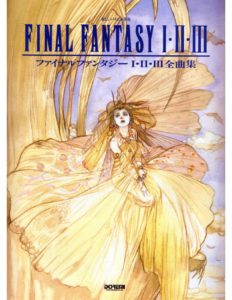
Sheet Music download here.
Music of the Final Fantasy VII series
Final Fantasy VII is a role-playing video game developed by Square (now Square Enix) and published by Sony Computer Entertainment as the seventh installment in the Final Fantasy series. Released in 1997, the game sparked the release of a collection of media centered on the game entitled the Compilation of Final Fantasy VII.
The music of the Final Fantasy VII series includes not only the soundtrack to the original game and its associated albums, but also the soundtracks and music albums released for the other titles in the collection.
The first album produced was Final Fantasy VII Original Soundtrack, a compilation of all the music in the game. It was released as a soundtrack album on four CDs by DigiCube in 1997. A selection of tracks from the album was released in the single-disc Reunion Tracks by DigiCube the same year. Piano Collections Final Fantasy VII, an album featuring piano arrangements of pieces from the soundtrack, was released in 2003 by DigiCube, and Square Enix began reprinting all three albums in 2004. To date, these are the only released albums based on the original game’s soundtrack, and were solely composed by regular series composer Nobuo Uematsu; his role for the majority of subsequent albums has been filled by Masashi Hamauzu and Takeharu Ishimoto.
The Compilation of Final Fantasy VII began eight years after the release of Final Fantasy VII with the release of the animated film sequel Advent Children in 2005. The soundtracks for each of the titles in the collection are included in an album, starting with the album release of the soundtrack to Advent Children that year. The following year, Nippon Crown released a soundtrack album to correspond with the video game Dirge of Cerberus, while Square Enix launched a download-only collection of music from the multiplayer mode of the game, which was only released in Japan. After the launch of the game Crisis Core in 2007, Warner Music Japan produced the title’s soundtrack. The latest album in the collection, Before Crisis: Final Fantasy VII & Last Order: Final Fantasy VII Original Soundtrack, was released by Square Enix the same year as a combined soundtrack album for the game Before Crisis and the animated movie Last Order.
The original music received highly positive reviews from critics, who found many of the tunes to be memorable and noted the emotional intensity of several of the tracks. The reception for the other albums has been mixed, with reactions ranging from enthusiastic praise to disappointment. Several pieces from the soundtrack, particularly “One-Winged Angel” and “Aeris’ Theme”, remain popular and have been performed numerous times in orchestral concert series such as Dear Friends: Music from Final Fantasy and Tour de Japon: Music from Final Fantasy. Music from the Original Soundtrack has been included in arranged albums and compilations by Square as well as outside groups.
Browse in the Library:
| Artist or Composer / Score name | Cover | List of Contents |
|---|---|---|
| Trinity Classical Guitar 2020-2023 INITIAL |
 |
|
| Trinity Classical Guitar Grade 05 2010-2015 |
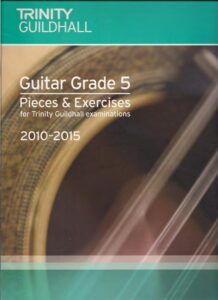 |
|
| Trinity Electronic Keyboard Grade 1 Pieces & Technical work |
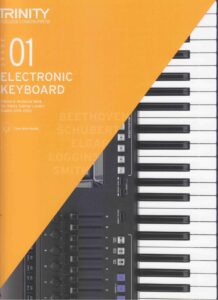 |
Trinity Electronic Keyboard Grade 1 |
| Trinity Electronic Keyboard Grade 2 Pieces & Technical work |
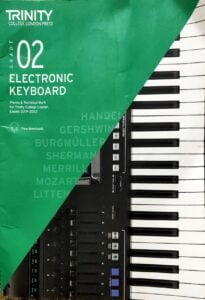 |
Trinity Electronic Keyboard Grade 2 |
| Trinity Electronic Keyboard Grade 6 Pieces & Technical work |
 |
Trinity Electronic Keyboard Grade 6 |
| Trinity Electronic Keyboard Grade 7 Pieces & Technical work |
 |
Trinity Electronic Keyboard Grade 7 |
| Trinity Electronic Keyboard Initial Grade 2019-2022 |
 |
|
| Trinity Electronic Keyboard Initial Pieces and Technical Work 2015-2018 |
 |
|
| Trinity Electronic Keyboard Sample Booklet |
 |
|
| Trinity Guitar 2016 2019 Grade 1 |
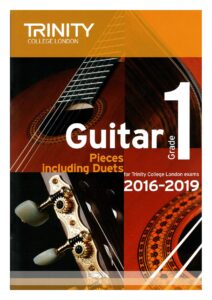 |
|
| Trinity Guitar 2016 2019 Grade 2 |
 |
|
| Trinity Guitar 2016 2019 Grade 3 |
 |
|
| Trinity Guitar 2016 2019 Grade 4 |
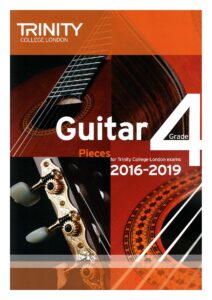 |
|
| Trinity Guitar 2016 2019 Grade 5 |
 |
|
| Trinity Guitar 2016 2019 Grade 6 |
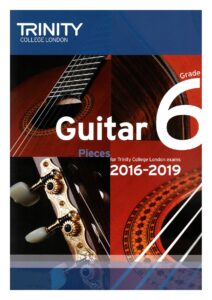 |
|
| Trinity Guitar 2016 2019 Grade 7 |
 |
|
| Trinity Guitar 2016 2019 Grade 8 |
 |
|
| Trinity Guitar 2016 2019 Initial |
 |
|
| Trinity Guitar Initial to Grade 5 Scales Arpeggios and studies |
 |
|
| Trinity Piano Grade 1 Pieces and exercises 2018 2020 |
 |
Trinity Piano Grade 1 Pieces and exercises 2018 2020 |
| Trinity Piano Grade 2 Pieces and exercises 2018 2020 |
 |
|
| Trinity Piano Grade 3 Pieces and exercises 2018 2020 |
 |
|
| Trinity Piano Grade 5 Pieces and exercises |
 |
|
| Trinity Piano Grade 6 (2021-2023) Extended Edition |
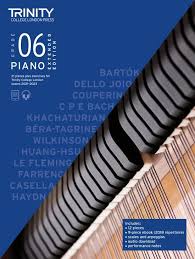 |
Trinity Piano Grade 6 (2021-2023) Extended Edition |
| Trinity Piano Grade 6 Pieces and exercises |
 |
|
| Trinity Piano Initial Piano 2018-2020 | Trinity Piano Initial Piano 2018-2020 | Trinity Piano Initial Piano 2018-2020 |
| Trinity Piano Pieces And Exercises Grade 1 2015 2017 |
 |
Trinity Piano Pieces And Exercises Grade 1 2015 2017 |
| Trinity Piano Pieces And Exercises Grade 2 2015 2017 |
 |
Trinity Piano Pieces And Exercises Grade 2 2015 2017 |
| Trinity Piano Pieces Grade 1 2021-2023 |
 |
Trinity Piano Pieces Grade 1 2021-2023 |
| Trinity Piano Pieces Grade 2 12 Piano Pieces 2021-2023 |
 |
Trinity Piano Pieces Grade 2 12 Piano Pieces 2021-2023 |
| Trinity Rock and Pop Guitar Grade 8 (Contemporary and classic songs) with Tablature |
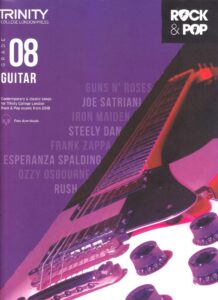 |
Trinity Rock and Pop Guitar Grade 8 (Contemporary and classic songs) |
| Trinity Sight Reading Book 1 Sound at sight Piano |
 |
|
| Trinity Theory Of Music Workbook Grade 1 |
 |
Trinity Theory Of Music Workbook Grade 1 |
| True Silent Hill-2- Akira-Yamaoka |
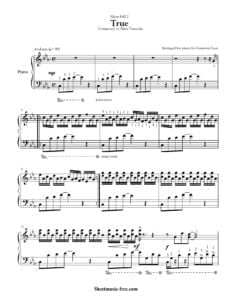 |
|
| Truman Show, The Reunion Philip Glass |
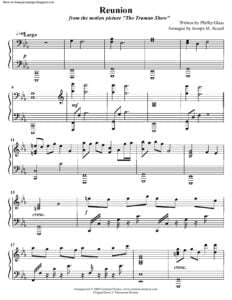 |
|
| Trumpet Method Allen Vizzutti Trumpet Method Book 1 2 3 Complete |
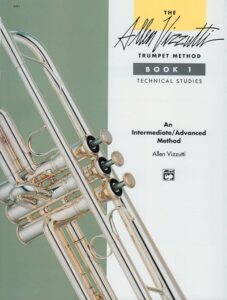 |
|
| Trumpet Method Anthony Plog Method For Trumpet Complete 7 books |
 |
|
| Trumpet Omnibook For B Flat Instruments Transcribed Exactly From Artist Recorded Solos |
 |
Trumpet Omnibook For B Flat Instruments Transcribed Exactly From Artist Recorded Solos |
| Trumpet Solos, Easy (The Canadian Brass) |
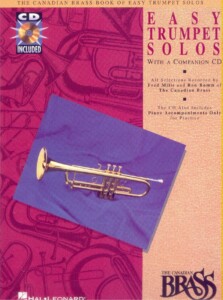 |
|
| Trumpet, The (John Wallace, Alexander McGrattan) Yale Musical Instruments Series (Book) |
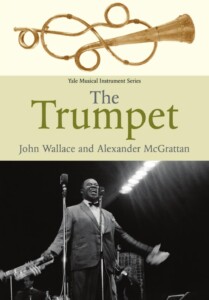 |
|
| Tsim Sha Tsui Stroll (Lust, Caution OST) Alexandre Desplat | ||
| Tu vuo’ fa’ l’Americano (Renato Carosone) | ||
| Tubular Bells (Mike Oldfield) |
 |
|
| Tubular Bells Intro – Mike Oldfield (Musescore File).mscz | ||
| Tuck Andress Europa by Carlos Santana guitar TABs |
 |
|
| Tuck Everlasting (The Musical) Music By Chris Miller Lyrics By Nathan Tysen (Piano Vocal Selections) |
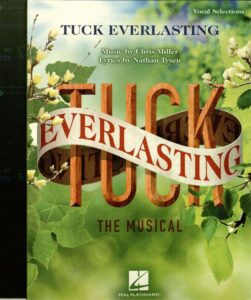 |
Tuck Everlasting (The Musical) Music By Chris Miller Lyrics By Nathan Tysen (Piano Vocal Selections) |
| Tunes For Ten Fingers A First Piano Book By Pauline Hall (Oxford) |
 |
|
| TV and Movie Themes (Piano, Vocal, Guitar) |
 |
TV and Movie Themes (Piano, Vocal, Guitar) |
| TV Detective Themes For Solo Piano |
 |
TV Detective Themes For Solo Piano |
| TV Fake Book, The |
 |
TV Fake Book, The |
| TV Songs Big Book Of TV Theme Songs 2nd Edition Piano Vocal Guitar |
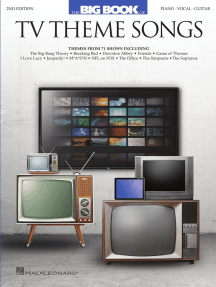 |
TV Songs Big Book Of TV Theme Songs 2nd Edition Piano Vocal Guitar Contents |
| Twelve Etudes Op 8 No 12 Scriabin (Musescore File).mscz | ||
| Twenty One Pilots – Goner |
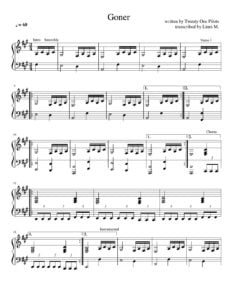 |
|
| Twenty One Pilots – Heathens – Piano |
 |
|
| Twenty One Pilots – Stressed Out Sheet Music | Twenty One Pilots – Stressed Out Sheet Music | |
| Twenty-Four Italian Songs And Arias Medium High |
 |
Twenty-Four Italian Songs And Arias, Medium High |
| Twice – Knock Knock Piano Solo |
 |
|
| Twilight – The Score – Carter Burwell |
 |
Twilight – The Score – CArter Burwell |
| Twilight saga – New Moon Music Score for Piano Solo Alexandre Desplat |
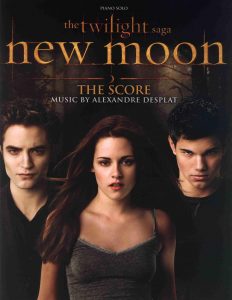 |
Twilight.New.Moon.Music.Score.for.Piano.Solo).Alexandre.Desplat |
| Twin Peaks – Audreys Dance Angelo Badalamenti | ||
| Twin Peaks – Laura Palmers Theme Angelo Badalamenti | ||
| Twin Peaks – Twin Peaks Theme Angelo Badalamenti | ||
| Twinkle Twinkle Little Star Variations Suzuki Guitar Vol. 1 (Musescore File).mscz | ||
| Two Socks theme (Dances with Wolves OST) John Barry | ||
| Two Steps From Hell Blackheart Piano Sheet Music by Thomas Bergersen |
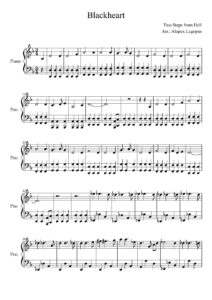 |
|
| Two Steps From Hell Flight Of The Silverbird (Piano Solo) Thomas Bergersen |
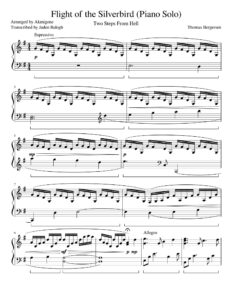 |
|
| Two Steps from Hell Invincible Sheet Music |
 |
|
| Two Steps From Hell Star Sky by Thomas Bergersen |
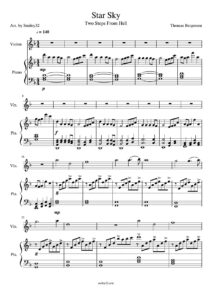 |
|
| Txarango – La Dansa Del Vestit En Fa M |
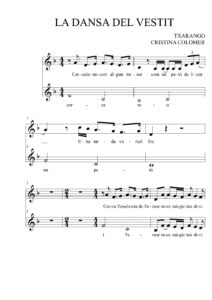 |
|
| Tymoczko, Prof. Dimitri MUSXI 105 Handouts 1 | Book Theory | |
| Tymoczko, Prof. Dimitri MUSIC 106 Handouts | Book Theory | |
| U2 The Piano Collection |
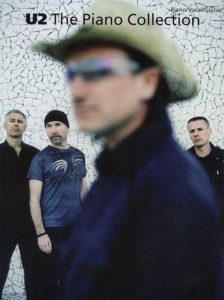 |
U2 The Piano Collection |
| U2 – All I Want Is U | ||
| U2 – Best Of – (Guitar Tab Songbook) |
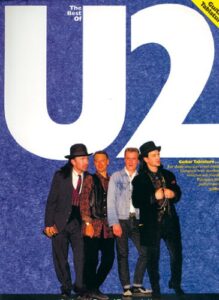 |
U2 – Best Of – (Guitar Tab Songbook) Contents — U2 – Best Of – (Guitar Tab Songbook) |
| U2 – How To Dismantle An Atomic Bomb (guitar tab songbook) |
 |
U2 – How To Dismantle An Atomic Bomb (guitar tab songbook) Contents — U2 – How To Dismantle An Atomic Bomb (guitar tab songbook) |
| U2 – October | ||
| U2 – Stuck In A Moment You Cant Get Out Of | ||
| U2 – The Best of 1990-2000 (Songbook) – U2 sheet music |
 |
U2 – The Best of 1990-2000 (Songbook) – U2 sheet music |
| U2 – The Best Of U2 (recorded versions) Guitar with TABs |
 |
U2 – Best Of – (Guitar Tab Songbook) |
| U2 – The Sweetest Thing | ||
| U2 Rock Score 5 Great Songs |
 |
|
| U2 The Joshua Tree Guitar Songbook with TABs |
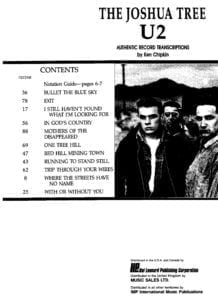 |
U2 The Joshua Tree Guitar Songbook |
| U2 WAR |
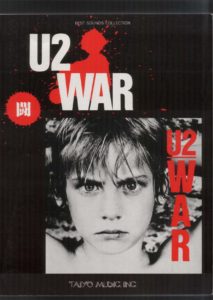 |
U2 WAR |
| UB40 The Best Of – Piano, vocal & Guitar Songbook |
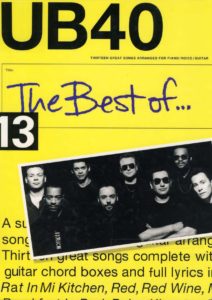 |
UB40 The Best Of – Piano, vocal & Guitar Songbook |
| Ubi Caritas – Ola Gjeilo (Musescore File).mscz | ||
| Ubi Caritas -Ola Gjeilo-with piano improvisation |
 |
|
| Ukelele Chord Finder – Easy to use Guide |
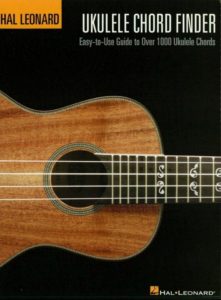 |
|
| Ukrainian folk song.mscz | ||
| Ukulele – 3-Chord Christmas Carols For Ukulele (Guitar Songbook Sheet Music) 30 Holiday Favorites With Just 3 Chords |
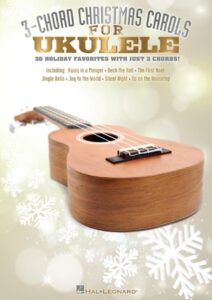 |
Ukulele – 3-Chord Christmas Carols For Ukulele (Guitar Songbook Sheet Music) 30 Holiday Favorites With Just 3 Chords |
| Ukulele – Simple Songs For Ukulele (Guitar Sheet Music) |
 |
Ukulele – Simple Songs For Ukulele (Guitar Sheet Music) |
| Ukulele – The Daily Ukulele (Songbook) – Jim Beloff Guitar Sheet Music |
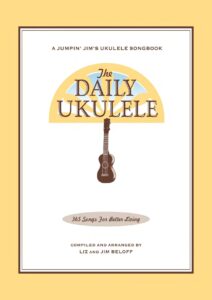 |
|
| Ukulele for Kids Songbook Ukulele Method |
 |
|
| Ultimate 80s Songs |
 |
Ultimate 80s Songs |
| Ultimate Guitar Chord-Book |
 |
|
| Ultimate Guitar Songbook with TABs |
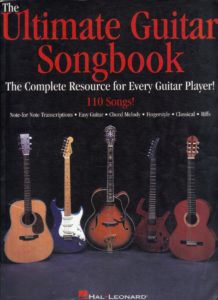 |
Ultimate Guitar Songbook, The (110 songs) |
| Ultimate Latin Piano Riffs – Carlos Campos & Andrew D.Gordon |
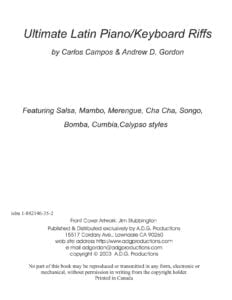 |
Ultimate Latin Piano Riffs – Carlos Campos & Andrew D.Gordon |
| Umberto Tozzi Gloria – Piano Vocal |
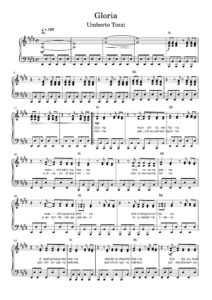 |
|
| Un air de liberté (Et maintenant on va où OST) Khaled Mouzanar | ||
| Un anno d’amore (Mina) | ||
| Un Homme et son Chien (Philippe Rombi) | ||
| Un Monstre À Paris La Seine And I By Vanessa Paradis & Sean Lennon (Piano Vocal) |
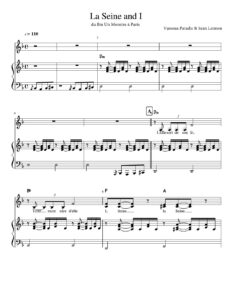 |
|
| Un Monstre à Paris – La Seine And I by Vanessa Paradis & Sean Lennon (Piano vocal).mscz | ||
| Una Mattina (Musescore File).mscz | ||
| Unchained Melody (Sheet Music) – The Righteous Brothers |
 |
|
| Under The Sea Ukulele Guitar From The Little Mermaid |
 |
|
| Under The Sea – Ukulele Guitar.mscz | ||
| Understanding chord progressions for Guitar by Arnie Berle |
 |
Understanding chord progressions for Guitar |
| Understanding The Fundamentals Of Classical Music Course Guide Modern Scholar (Book) |
 |
|
| Undertale Full OST – Toby Fox |
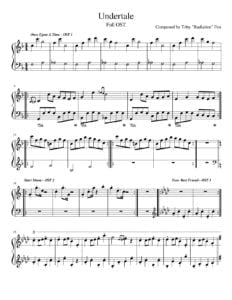 |
|
| Undertale Megalovania Piano – Toby Fox |
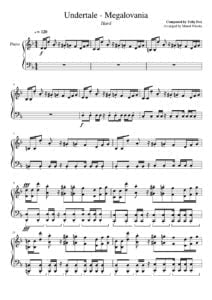 |
|
| Undertale – Home |
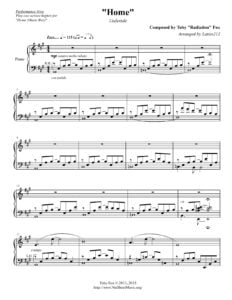 |
|
| Undertale – Megalovania | ||
| Undertale OST – Hopes and Dreams Save the World |
 |
|
| UNDERTALE OST – Hopes and Dreams Save the World Piano Solo.mscz | ||
| Undertale OST – Hopes and DreamsSave the World.mscz | ||
| Undertale Ost – Nyeh Heh Heh! Bonetrousle |
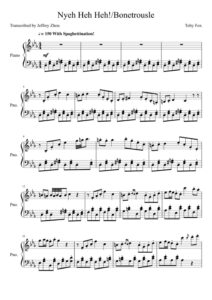 |
|
| Une Heure de Plus (Erik Berchot) | ||
| Unfaithful (Rihanna) | ||
| Unfinished Music – Richard Kramer |
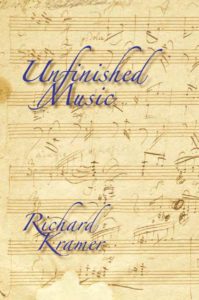 |
|
| Unforgettable – Irving Gordon (Nat King Cole Song) (Musescore File).mscz |
Creation and development

Final Fantasy VII was scored by the series’ main composer Nobuo Uematsu
Nobuo Uematsu composed the music of Final Fantasy VII in less than one year, matching the game’s development time, although he had taken two years to create the soundtrack for the previous title, Final Fantasy VI. Final Fantasy VII was the first game in the series to be developed for the PlayStation, and while the media capabilities of the console allowed for pre-recorded Linear PCM (often as Red Book audio tracks on the CD), it was decided to generate the music in real time on the console instead, using samples and note data. This decision has been credited as giving the soundtrack “a very distinctive mood and feel”, forming a strong association for listeners between the game and its soundtrack.
Uematsu had initially planned to use vocal performances for the game to take advantage of the console’s capabilities, but found that the advanced audio quality required in turn made the game have much longer loading times in each area. Uematsu decided that the quality was not worth the effects on gameplay, though after the release and seeing Suikoden II (1998, PlayStation), which had used higher-quality music instead, he reversed his stance for Final Fantasy VIII. There was a plan to use a “famous vocalist” for the ending theme to the game as a “theme song” for the game, but time constraints and thematic concerns, caused the idea to be dropped. Uematsu has stated, however, that the move into the “PlayStation era”, which allowed video game composers to use sounds recorded in the studio rather than from synthesizers, had “definitely been the biggest change” to video game music.
Uematsu’s approach to composing the game’s music was to treat it like a film soundtrack and compose songs that reflected the mood of the scenes rather than trying to make strong melodies to “define the game”, as he felt that approach would come across too strong when placed alongside the game’s new 3D visuals. As an example, he composed the track intended for the scene in the game where Aerith Gainsborough is killed to be “sad but beautiful”, rather than more overtly emotional, creating what he feels is a more understated feeling. Uematsu has additionally said that the soundtrack has a feel of “realism”, which also prevented him from using “exorbitant, crazy music”.
The first piece that Uematsu composed for the game was the opening theme; game director Yoshinori Kitase showed him the opening cinematic to the game and asked him to begin the project there. The track was well received in the company, which gave Uematsu “a sense that it was going to be a really good project”. He later stated in the liner notes for the soundtrack album that the music for Final Fantasy VII was his “greatest harvest” to date.
Final Fantasy VII was the first game in the series to include a track with digitized vocals, “One-Winged Angel”. The track has been called Uematsu’s “most recognizable contribution” to the music of the Final Fantasy series, though the composer did not expect it to gain such popularity. The piece, described as “a fanfare to impending doom”, is said to not “follow any normal genre rules” and has been termed “possibly the most innovative idea in the series’ musical history”.
Uematsu approached the piece, which accompanies the final battle of the game, in a different manner than previous “boss tracks”: as he felt that using his normal approach would cause unfavorable comparisons to his well-received Final Fantasy VI boss tracks, he instead tried to take a different approach. Inspired by The Rite of Spring by Igor Stravinsky to make a more “classical” track, and by rock and roll music from the late 1960s and early 1970s to make an orchestral track with a “destructive impact”, he spent two weeks composing short unconnected musical phrases, and then arranged them together into a song, an approach he has never used before or since.
The lyrics of “One-Winged Angel”, a Latin choral track that plays at the climax of the game, were taken from the medieval poetry that forms the basis of Carl Orff‘s Carmina Burana, specifically “Estuans Interius”, “O Fortuna“, “Veni, Veni, Venias” and “Ave Formosissima”. Uematsu has stated that the intro of “One-Winged Angel” is based on Jimi Hendrix‘s “Purple Haze“, that the piece revolves around the image of Sephiroth, and that despite the chorus and orchestra, he still thinks of it as a “rock piece”. He said in a 2005 interview that “One-Winged Angel” is his favorite tune from the soundtrack, and in 2004 that it was his favorite battle theme from any Final Fantasy game.
Final Fantasy VII Albums
Original Soundtrack
Final Fantasy VII Original Soundtrack is a soundtrack album containing musical tracks from the game, composed by Nobuo Uematsu and produced by Uematsu and Minoru Akao. It was originally released on February 10, 1997 through DigiCube and later reissued directly by Square Enix on May 10, 2004. The soundtrack spans 85 tracks over four discs and has a combined duration of 4:39:53. A limited edition was produced along with the original album, containing illustrated liner notes with several pictures of Uematsu’s workspace and personal effects, various cutscenes and in-game screenshots from the game, and a discography.
The soundtrack covers a wide variety of musical genres, including rock, techno, orchestral, and choral, although the soundtrack as a whole is primarily orchestral. While many of the tracks were intended as background music, reviewers noted the emotional intensity of several tracks, especially “Aerith’s Theme”, which plays during a moment described as “the most shocking moment in video games,” and has been described as the most memorable track from the album. The theme has become popular among fans, and has inspired various arrangements. Other notable tracks include “Main Theme of Final Fantasy VII”. Themes from this track play during several other tunes from the soundtrack, such as “Words Drowned by Fireworks”, to tie the soundtrack together.
The regular edition of the album reached No. 3 on the Japan Oricon charts, while the limited edition reached No. 19. Overall, the album sold 148,000 copies as of January 2010, with the limited edition selling a further 21,000. The album was well received by critics. Allmusic awarded Uematsu’s original soundtrack a five-star rating.
Ben Schweitzer of RPGFan claimed that “for the most part, it’s a diamond”, with his primary complaint being the quality of the MIDI sound. He found the tracks to be “beautiful” and said that “One-Winged Angel” was “possibly the most innovative idea in the series’ musical history”.
Patrick Gann of RPGFan concurred and found all of the soundtrack’s tunes to be “memorable” and the Original Soundtrack to be “very worth the purchase”. Philip of Square Enix Music Online, however, disliked the sound quality of the soundtrack and saw several tracks as “trivial”, though he did note that Uematsu “has a flair for strong, memorable” pieces. In 2006, IGN ranked the album as the best Final Fantasy soundtrack to date and cited the “gripping” character themes and “One-Winged Angel” in particular as contributing factors. They also named “One-Winged Angel” as the best piece of music from the entire Final Fantasy series.
The original CDs for both releases were only published in Japan and include only Japanese track names. The official English track names were later added to digital releases of the soundtrack.
